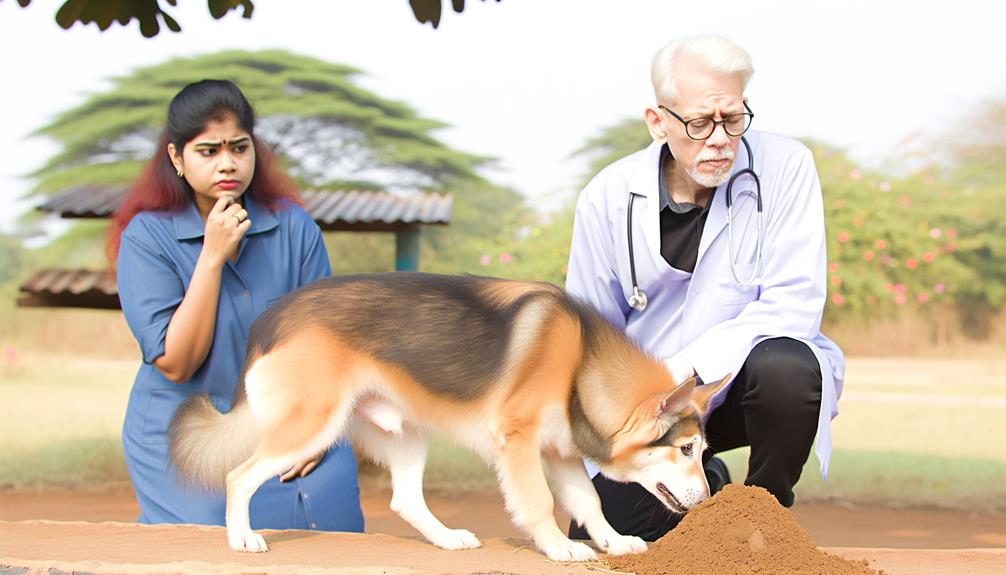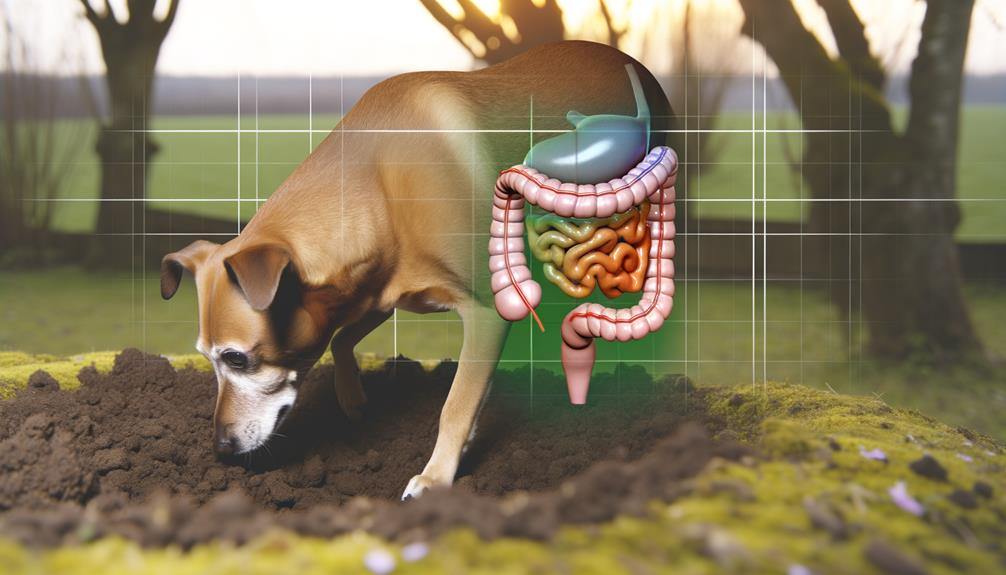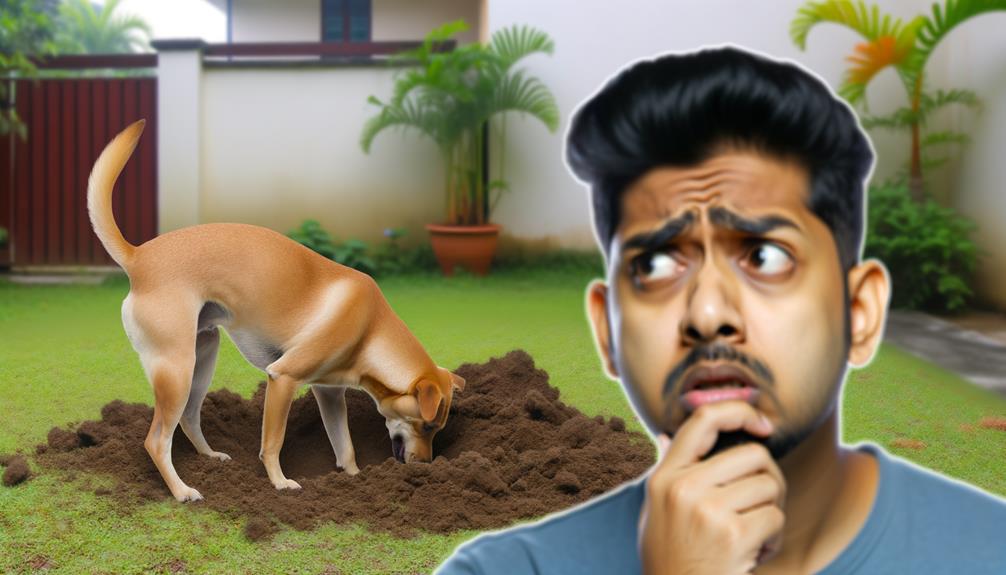You've probably seen your dog doing it – nose to the ground, mouth full of dirt, seemingly enjoying himself. But why do dogs eat dirt? Is it due to a nutrient deficiency, or something more concerning like pica or digestive issues? Or could it be linked to behavioral factors like boredom or anxiety? While many reasons could explain this behavior, understanding the root cause can help you manage it better. As we explore these possibilities, you might find some surprising insights into your furry friend's peculiar habits.
Understanding Pica in Dogs

To understand why your dog might be eating dirt, it's vital to first grasp the concept of Pica, a condition common in dogs that drives them to eat non-food substances. Pica might seem puzzling to you, but it's a reality for many pets and their owners. Now, let's dive into Pica diagnosis and treatment options.
Diagnosing Pica isn't always straightforward. You'll need to observe your dog's behavior closely. Are they consistently eating dirt or other non-food items? If yes, it's time to consult with a vet. The vet might conduct various tests to rule out other health issues that could be causing this behavior.
Once Pica is diagnosed, treatment options will depend on the underlying cause. If it's due to anxiety or stress, behavior modification techniques or medications may be suggested. In some cases, it might be a sign of an underlying medical condition, which will need treatment.
Nutrient Deficiency: A Possible Cause

You might be wondering if your dog is eating dirt because it's missing something in its diet. Nutrient deficiency is indeed a possible cause, which we'll explore further.
We'll also discuss dietary solutions that can help address this issue.
Understanding Nutrient Deficiency
Ever wondered why your dog might be eating dirt due to a nutrient deficiency? It's a legitimate concern. Just as you need a balanced diet, so does your four-legged friend.
Soil ingestion risks can be high, including exposure to harmful bacteria and parasites. However, your dog may resort to this if they're not getting enough minerals from their regular food. A lack of certain nutrients can trigger unusual eating behaviors, like chowing down on dirt, in an attempt to supplement their diet.
Mineral supplementation benefits are multifold, from aiding digestion to promoting a healthy coat. But if you've noticed your pooch is having a dirt feast, it could signal a nutrient deficiency. It's crucial to address this issue promptly to ensure your pet's wellbeing.
Dietary Solutions for Deficiency
So, if your furry friend's dirt-eating habit hints at a nutrient deficiency, there are dietary solutions to address this issue.
Supplement options are abundant and can provide your dog with the essential nutrients they may be missing. You can incorporate vitamin and mineral supplements into their diet, but it's important to consult with your vet first. Too much of certain nutrients can be harmful.
Natural remedies are also beneficial. You could consider adjusting their diet to include more nutrient-dense foods. Fresh fruits, vegetables, and lean meats can help provide the vitamins and minerals your dog needs.
Digestive Issues and Dirt-Eating

You might be surprised to learn that your dog's dirt-eating might be linked to digestive issues.
It's not just about the odd flavor attraction, but it could also be a sign of an upset tummy.
Let's discuss this further to understand why your furry friend might be exhibiting such behavior.
Canine Digestion Problems
If your furry friend is chowing down on dirt, it might be a sign of digestive issues. The dirt your dog is devouring might contain minerals that their body is lacking due to digestive complications. Canine allergies or food intolerances could be the culprits behind these problems.
Similar to humans, dogs can develop allergies to certain foods, leading to an upset stomach, bloating, and even diarrhea. Food intolerance, on the other hand, may cause similar symptoms but is a result of your dog's body struggling to digest certain types of food.
If you notice that your pooch is frequently munching on dirt, it's essential to understand there could be an underlying health issue. Consult a vet to rule out allergies, food intolerances, or other digestion-related problems.
Understanding Dirt-Eating Behavior
Understanding why your dog is turning to dirt for a meal requires a closer look at their eating habits and overall health, specifically focusing on potential digestive issues. The act of dirt tasting, or geophagia, can be a sign that your furry friend isn't getting enough nutrients from their diet or that they're experiencing gastrointestinal discomfort.
Geophagia causes can range from mineral deficiencies to parasites, or it can simply be a result of boredom or stress. It's crucial to monitor your dog's behavior and consult with a vet if you notice them persistently eating dirt. You might need to adjust their diet or address underlying health issues to curb this behavior.
Dogs and Their Instinctual Behaviors

In unravelling the mystery of why dogs eat dirt, we'll first delve into their instinctual behaviors, revealing a world driven by primal urges and survival tactics. Your furry friend isn't just a beloved pet, but a complex creature with deep-seated instincts inherited from their wild ancestors.
Canine communication and pack hierarchy play significant roles in these instincts. Dogs communicate through a variety of means including body language, vocalization, and even scent. They're adept at reading the signals of other dogs and responding appropriately. This ability to understand and respond to canine communication can sometimes lead to behaviors that seem strange to us, like eating dirt.
Pack hierarchy is also essential in understanding your dog's actions. In the wild, dogs live in packs with clearly defined roles. Alpha dogs lead, while others follow their lead. This hierarchy influences their decision-making process and behaviors. When you see your dog eating dirt, it may be an instinctual behavior tied to their position in your family 'pack.'
Boredom or Anxiety: Behavioral Factors

Beyond instinctual behaviors, your dog's dirt-eating habit could be a sign of boredom or anxiety. Much like humans, dogs can turn to odd behaviors when they're feeling stressed or under-stimulated. Your dog's dirt consumption could be their unique way of expressing these feelings.
But don't worry, there are ways to help manage your dog's stress and boredom. Stress management for dogs involves creating a calm and stable environment. This could mean establishing a regular routine so your dog knows what to expect, or it might involve using calming scents or sounds to create a soothing atmosphere.
Meanwhile, environmental enrichment is another effective strategy. This involves creating an environment that stimulates your dog's senses and encourages them to engage in natural behaviors. Think of it as doggy daycare at home. You can use toys, puzzles, or even just different types of surfaces for them to explore.
Potential Risks of Dirt Consumption

While it might seem harmless, your dog's dirt-eating habit can pose several health risks. The most significant risk is parasitic infections. Dirt can harbor a variety of harmful parasites, like roundworms, hookworms, and giardia. When your dog ingests dirt, they're also swallowing these parasites, which can lead to serious illnesses. Symptoms might include vomiting, diarrhea, weight loss, and an overall decline in health.
Toxin exposure is another risk associated with dirt consumption. Dirt can contain pesticides, fertilizers, or other harmful chemicals used in gardening or farming. If your dog eats dirt contaminated with these toxins, it could result in poisoning. Symptoms can range from mild (like loss of appetite or lethargy) to severe (like seizures or even death).
Even if you think the dirt in your yard is clean, it's not worth the risk. Remember, harmful parasites and toxins are often invisible to the naked eye. It's always better to be safe than sorry. Keep an eye on your dog's behavior and discourage dirt-eating whenever possible. In the next section, we'll discuss practical strategies to stop dirt eating.
Practical Strategies to Stop Dirt Eating

Now that you're aware of the risks associated with dirt eating, let's explore some effective strategies to curb this behavior in your dog.
One of the most practical approaches involves Dirt Detection Methods. These can be as straightforward as regularly inspecting your dog's mouth and watching its behavior when outside. If you notice your dog frequently digging or chewing something in the dirt, there's a chance it's consuming soil.
Another strategy is Supervised Outdoor Time. Don't just let your dog roam freely outside unsupervised. Make sure you're there to monitor its activities. If you spot your dog eating dirt, immediately distract it with a toy or game. Over time, your dog will associate outdoor time with fun activities, not dirt eating.
You could also try to make your dog's diet more appealing. If it's eating dirt because its food lacks certain nutrients, try adding a supplement to its meals. Always consult with a vet before doing this.
Frequently Asked Questions
What Are Some Other Unusual Eating Habits Observed in Dogs?
Besides dirt-eating, you might've noticed other odd canine behaviors like Pica in Dogs, where they eat non-food items, or Canine Coprophagia, where they consume their own or other animals' feces. It's quite peculiar, isn't it?
Could a Dogs Breed Influence Its Likelihood to Eat Dirt?
Your dog's breed might indeed impact its tendency to eat dirt. Breed characteristics can play a role in dietary habits. So, your pet's breed could potentially influence its unusual appetite for dirt.
Are There Specific Types of Dirt or Soil That Dogs Prefer to Eat?
Sure, dogs may show preference based on dirt nutrition content and soil taste differences. They're often drawn to soils rich in nutrients or those that taste unique. But, it varies from dog to dog.
Do Certain Seasons or Weather Conditions Trigger Dogs to Eat Dirt?
You might notice your dog eating dirt more in certain seasons. This could be due to dietary deficiencies or a parasite infestation. It's not necessarily the weather, but what's happening internally with your pet.
Can a Change in a Dogs Environment Lead to Dirt Consumption?
Yes, environmental changes can stress your dog, triggering unusual behaviors like dirt eating. It's crucial you're aware of any shifts in your dog's environment that could be potential dirt eating causes or other stressors.
Conclusion
So, your pooch might be eating dirt due to pica, nutrient deficiencies, digestive issues, instinctual behaviors, or maybe even boredom or anxiety.
It's important to understand these potential causes to help manage this behavior effectively. Remember, consuming dirt can be risky for your furry friend.
But don't worry! There are practical strategies you can implement to stop this habit. Just make sure to keep an eye on your dog and consult a vet if necessary.







